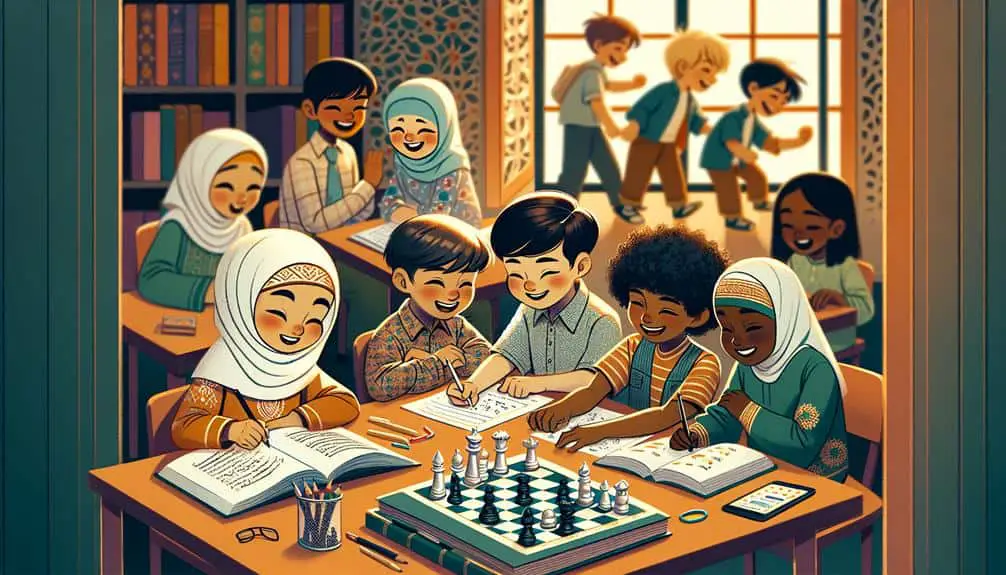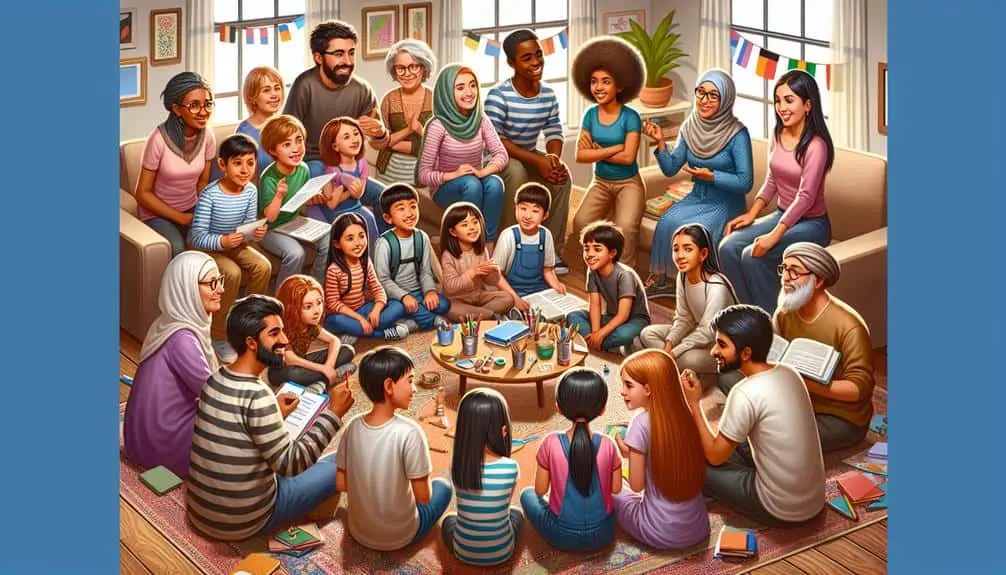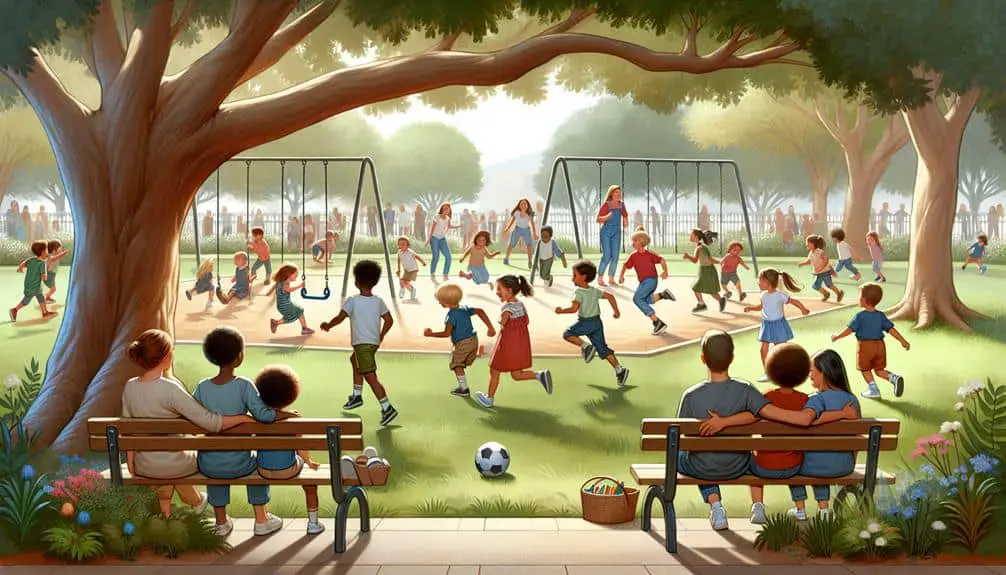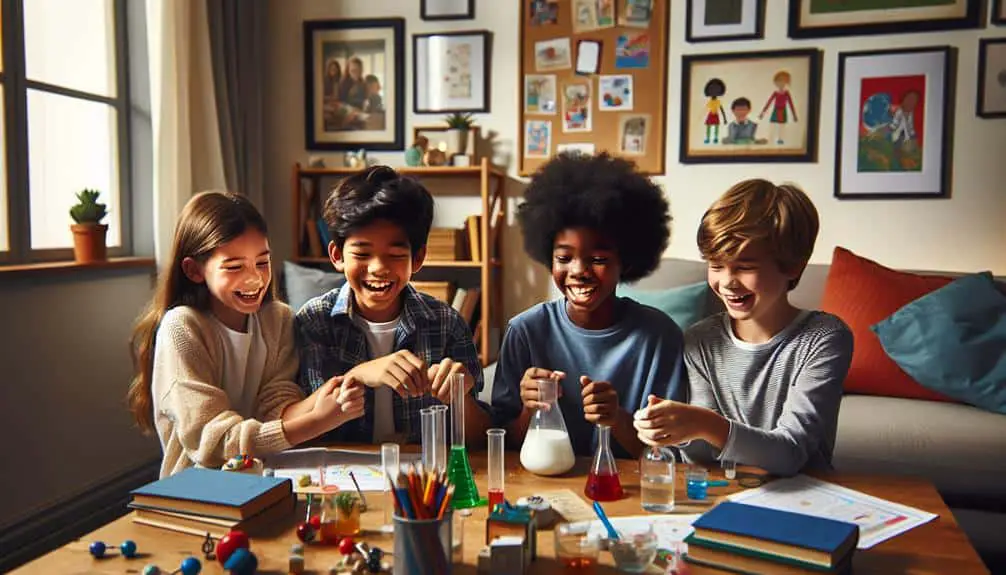Understanding friendship dynamics in homeschool socialization involves acknowledging the various social opportunities and obstacles children face. Homeschooled kids participate in co-op classes, extracurricular activities, and community events for peer interaction. Positive friendships boost self-esteem and social skills, while negative dynamics might lead to feelings of isolation. Strategies like group classes, playdates, and extracurricular involvement help foster positive relationships. Overcoming socialization challenges requires joining homeschooling groups and seeking diverse social experiences. Parents play a pivotal role in organizing social gatherings and teaching communication skills. Comprehending these dynamics is key to supporting your child's social development.
Key Points
- Regular playdates and group classes enhance social interaction.
- Join homeschooling support groups for a sense of community.
- Participation in extracurricular activities broadens social experiences.
- Parents can organize social gatherings to facilitate peer connections.
- Teaching social skills like conflict resolution is crucial for positive friendships.
Understanding Socialization Concerns in Homeschooling
Understanding socialization concerns in homeschooling often arises due to misconceptions about the opportunities for children to interact with peers outside of a traditional school setting. Socialization misconceptions often revolve around the belief that homeschooled children lack peer interaction and are isolated from social experiences. However, research indicates that homeschooled children have ample opportunities for peer interaction within the homeschool community.
Peer interaction in homeschooling isn't limited to traditional school settings but extends to various avenues such as co-op classes, extracurricular activities, sports teams, and community events. These interactions allow homeschooled children to develop social skills, form friendships, and engage in group activities. Contrary to the misconception that homeschoolers lack socialization, studies have shown that homeschooled children often have strong friendships and positive social experiences.
Impact of Friend Dynamics on Homeschooled Children
The impact of friend dynamics on homeschooled children can greatly influence their social development and overall well-being. Peer influence plays a significant role in shaping how homeschooled children perceive themselves and others, impacting their emotional development. Positive friendships can provide a sense of belonging and support, contributing to higher self-esteem and emotional well-being. On the other hand, negative peer dynamics can lead to feelings of isolation and inadequacy, affecting the child's mental health.
Moreover, communication skills and conflict resolution are essential aspects influenced by friend dynamics. Homeschooled children who've positive peer interactions tend to develop effective communication skills through regular socialization. They learn to express themselves, listen actively, and navigate different social situations. Additionally, resolving conflicts with friends teaches them valuable lessons in compromise, empathy, and problem-solving.
Strategies to Foster Positive Friendships in Homeschooling
To cultivate positive friendships in homeschooling, implementing structured social activities is vital for fostering social interaction and connection among children. Building relationships and creating connections is essential for the social development of homeschooled children.
Here are some strategies to foster positive friendships in homeschooling:
- Organize Regular Playdates: Setting up consistent playdates with other homeschooling families can provide children with opportunities to bond and form friendships in a relaxed environment.
- Engage in Group Classes or Co-ops: Participating in group classes or cooperatives can allow children to interact with peers regularly, fostering a sense of community and friendship.
- Join Homeschooling Support Groups: Being part of homeschooling support groups enables children to connect with others who share similar experiences, creating a sense of belonging and friendship.
- Encourage Extracurricular Activities: Involvement in extracurricular activities such as sports teams, art classes, or music lessons can help children meet peers with similar interests, leading to the development of meaningful friendships.
Overcoming Challenges in Homeschool Socialization
Overcoming socialization challenges in homeschooling requires proactive measures to address potential barriers and promote important peer interactions. Peer support plays a vital role in helping homeschooled children develop social skills and navigate various challenges they may encounter.
One common challenge is the limited opportunities for social interaction compared to traditional schooling settings. To overcome this, seeking out homeschooling groups, co-ops, or community activities can provide valuable opportunities for children to engage with peers in a structured environment. These settings not only offer chances for socialization but also enable children to develop friendships based on shared interests and experiences.
Another challenge is the lack of exposure to diverse social situations, which can hinder the development of essential social skills. Encouraging participation in extracurricular activities, sports, or volunteer work can broaden a child's social experiences and help them learn how to interact with a variety of individuals.
Role of Parents in Facilitating Friendships for Homeschooled Kids
In supporting the social development of homeschooled children, parents play an essential role in facilitating friendships and fostering positive peer interactions. Parent involvement in fostering friendships among homeschooled kids is vital for their social growth.
Here are some ways parents can support their children in building and maintaining friendships:
- Organize Social Gatherings: Arrange playdates or group activities to help your child connect with peers.
- Encourage Extracurricular Involvement: Support your child's participation in clubs, sports, or classes where they can meet other children with similar interests.
- Teach Social Skills: Provide guidance on how to initiate conversations, share, and resolve conflicts effectively.
- Communicate with Other Parents: Stay in touch with other homeschooling families to create opportunities for your child to interact with a variety of peers.




